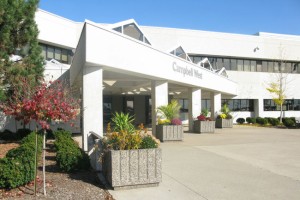By Rob Houle, St. Catharines Standard
The state of our roads are bad for business — in more ways than one.
Poor roads are not only harsh on company fleets, they go a long way in turning off tourists, Niagara Falls regional Coun. Bob Gale says.
Gale made the comments during the tabling of a pavement condition and bridge appraisal status report at Niagara Region’s public works committee meeting Thursday morning.
Gale singled out the industrial area of Port Weller on Lakeshore Rd. near the St. Catharines/Niagara-on-the-Lake border as one in which business owners avoid.
“You would not buy into that if you were truckers,” Gale said, picking up on earlier comments from Niagara-on-the-Lake regional Coun. Gary Burroughs about the decrepit state of Lakeshore Rd.
“Because you have to come down Lakeshore Rd., which is one of your worst roads, turn on Stewart Rd. to get to the highway … you follow that road down and you’re going through the roof of your cab.”
Gale said the same applies to a section of York Rd. near the Perfume Factory.
“If you’re driving a tractor trailer there, you’re going through the roof on one bump. You don’t notice it in a car, but every tractor trailer notices,” Gale said.
He said his daughter’s fuel-tanker trucks take a beating in that area so drivers are advised to use alternate routes for deliveries.
Gale also said bad roads were a detriment to tourism.
“Roads are tourism,” Gale said.
“If you want to do a circle of Niagara, it’s disgraceful,” he said, describing a route down Dominion Rd. in Fort Erie and Stanley Ave. or the Niagara Parkway in Niagara Falls and Lakeshore Rd. in Niagara-on-the-Lake into St. Catharines.
“We should be taking some money out of the investments we have … or maybe some of our economic development can be put into our roads,” Gale said.
The report notes $250 million will be needed over the next 10 years to maintain the government’s 1,654 lane kilometres of paved roads, meaning a yearly average of $16 million for reconstruction and $9 million for resurfacing. The roads resurfacing allocation for 2015 is $7 million, well short of the $14 million the staff report says is needed to address the current backlog. A chart in the report giving the hypothetical scenario of an unlimited roads budget would see $101 million spent on road reconstruction in 2015 and $14 million on resurfacing.
St. Catharines regional Coun. Bruce Timms called on fellow councillors to increase spending on roads.
“The council needs to consider shifting emphasis in budget considerations to roads and bridges, given that our regional network is the arterial roads and the most directly related to prosperity,” Timms said. “Good arterial roads are a very big consideration for businesses coming into our region and we can’t afford to let them get too far deteriorated. They are, to me, a higher priority.”
The state of our roads are bad for business — in more ways than one.
Poor roads are not only harsh on company fleets, they go a long way in turning off tourists, Niagara Falls regional Coun. Bob Gale says.
Gale made the comments during the tabling of a pavement condition and bridge appraisal status report at Niagara Region’s public works committee meeting Thursday morning.
Gale singled out the industrial area of Port Weller on Lakeshore Rd. near the St. Catharines/Niagara-on-the-Lake border as one in which business owners avoid.
“You would not buy into that if you were truckers,” Gale said, picking up on earlier comments from Niagara-on-the-Lake regional Coun. Gary Burroughs about the decrepit state of Lakeshore Rd.
“Because you have to come down Lakeshore Rd., which is one of your worst roads, turn on Stewart Rd. to get to the highway … you follow that road down and you’re going through the roof of your cab.”
Gale said the same applies to a section of York Rd. near the Perfume Factory.
“If you’re driving a tractor trailer there, you’re going through the roof on one bump. You don’t notice it in a car, but every tractor trailer notices,” Gale said.
He said his daughter’s fuel-tanker trucks take a beating in that area so drivers are advised to use alternate routes for deliveries.
Gale also said bad roads were a detriment to tourism.
“Roads are tourism,” Gale said.
“If you want to do a circle of Niagara, it’s disgraceful,” he said, describing a route down Dominion Rd. in Fort Erie and Stanley Ave. or the Niagara Parkway in Niagara Falls and Lakeshore Rd. in Niagara-on-the-Lake into St. Catharines.
“We should be taking some money out of the investments we have … or maybe some of our economic development can be put into our roads,” Gale said.
The report notes $250 million will be needed over the next 10 years to maintain the government’s 1,654 lane kilometres of paved roads, meaning a yearly average of $16 million for reconstruction and $9 million for resurfacing. The roads resurfacing allocation for 2015 is $7 million, well short of the $14 million the staff report says is needed to address the current backlog. A chart in the report giving the hypothetical scenario of an unlimited roads budget would see $101 million spent on road reconstruction in 2015 and $14 million on resurfacing.
St. Catharines regional Coun. Bruce Timms called on fellow councillors to increase spending on roads.
“The council needs to consider shifting emphasis in budget considerations to roads and bridges, given that our regional network is the arterial roads and the most directly related to prosperity,” Timms said. “Good arterial roads are a very big consideration for businesses coming into our region and we can’t afford to let them get too far deteriorated. They are, to me, a higher priority.”
Last Modified: May 15, 2015 11:58 AM

